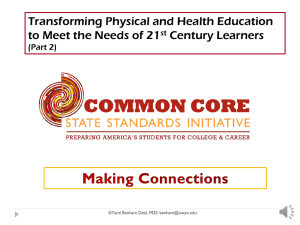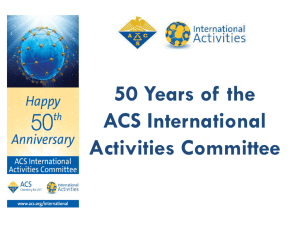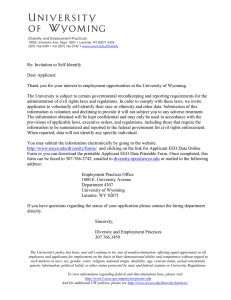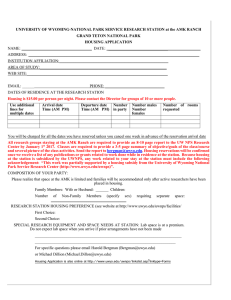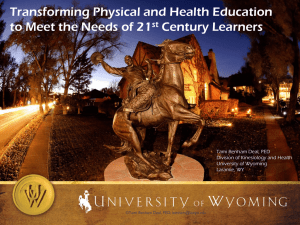2013 Central District Presentation Part 2
advertisement
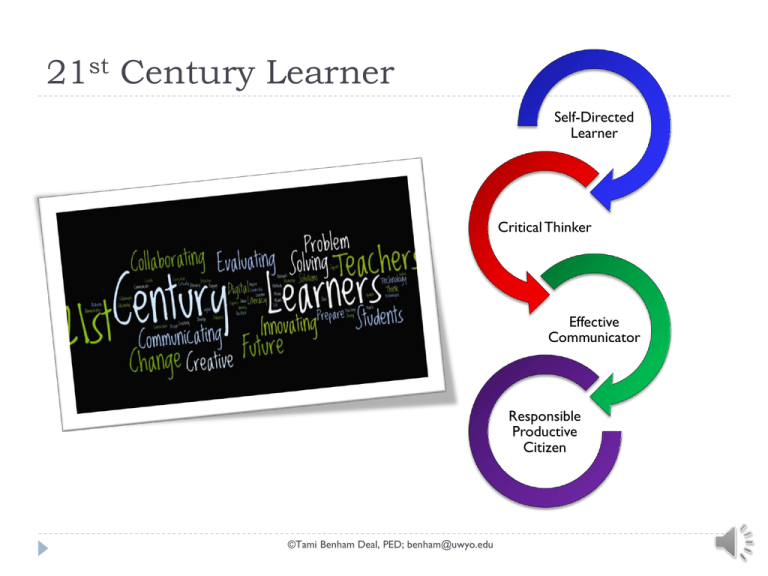
21st Century Learner Self-Directed Learner Critical Thinker Effective Communicator Responsible Productive Citizen ©Tami Benham Deal, PED; benham@uwyo.edu Self-Directed Learner Self-directed learners engage in a continual process of: Self-management establish clear goals about their health thoroughly gather valid information about their health use a systematic approach to solving health related problems and making decisions about their health use articulate, thoughtful communication Self-monitoring consciously reflect on their health-related plans, decisions, and actions consider and evaluate the ramifications of their health-related thoughts, plans, decisions, and actions Self-modification revise decisions and strategies when needed to maintain or improve health and reduce health risk strive to maximize health based on feedback (from self and others) ©Tami Benham Deal, PED; benham@uwyo.edu What National or State Standards in health education reflect these skills? What National or State Standards in physical education reflect these skills? Where could these skills be applied in physical education? Critical Thinker Reasons Effectively Use various types of reasoning (inductive, deductive, etc.) to solve health related problems as appropriate to the situation Use Systems Thinking Analyze how factors work together and interact to make a person healthy or unhealthy Make Judgments and Decisions Effectively analyze and evaluate evidence, arguments, claims and beliefs about health Analyze and evaluate major alternative points of view about health issues Synthesize and make connections between health information and arguments Interpret health information and draw conclusions and solutions based relevant criteria and standards Reflect critically on health related information, decisions and actions Solve Problems Solve different kinds of non-familiar health related problems in both conventional and innovative ways Identify and ask significant questions that clarify various points of view and lead to better solutions Communicates effectively with others in figuring out solutions to complex health problems What National or State Standards in health education reflect these skills? What National or State Standards in physical education reflect these skills? Where could these skills be applied in physical education? ©Tami Benham Deal, PED; benham@uwyo.edu Source: http://www.p21.org/ Effective Communicator Clearly articulates thoughts and ideas about health using oral, written and nonverbal communication skills in a variety of forms and contexts Listen effectively to decipher meaning including health knowledge, values, attitudes and intentions Use communication for a range of purposes to inform, instruct, motivate and persuade Utilize multiple media and technologies to communicate and work collaboratively on health related issues know how to evaluate their effectiveness a priori as well as assess their impact Communicate effectively in diverse environments (including multi-lingual) ©Tami Benham Deal, PED; benham@uwyo.edu What National or State Standards in health education reflect these skills? What National or State Standards in physical education reflect these skills? Where could these skills be applied in physical education? Source: http://www.p21.org/ Responsible Productive Citizen Contributes to health of the community/nation What National or State Standards in health education reflect these skills? by taking action to prevent disease and injury to self and others by taking action to reduce the risk of disease and injury to self and others Advocates for community and environmental health ©Tami Benham Deal, PED; benham@uwyo.edu What National or State Standards in physical education reflect these skills? Where could these skills be applied in physical education?

